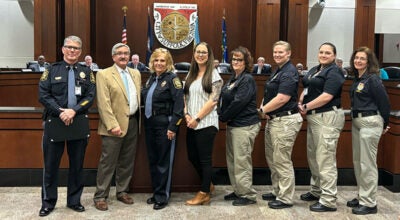Council to look at line-of-duty exemption
Published 10:42 pm Friday, June 7, 2019
Suffolk City Council has asked city staff to look into the fiscal impact of exempting surviving spouses of first responders killed in the line of duty from paying property taxes.
The council voted 7-1 in favor of a motion from Councilman Mike Duman to have city staff prepare a report that would outline the cost of enacting an ordinance that would provide the exemptions. Curtis Milteer was the lone vote against it. City Council is to receive a presentation on it at its July 17 meeting.
Virginia voters in 2016 voted overwhelmingly in favor of a referendum that allows localities to exempt the surviving spouses of first responders killed in the line of duty from paying property taxes.
Duman asked the city to look at this exemption in the wake of the mass shooting in Virginia Beach May 31, in which 13 people were killed — including the shooter — and five others were injured, including a Virginia Beach police officer.
“Obviously, what happened recently in Virginia Beach brought this back, top of mind and … became a catalyst for me to revisit the possibility of enacting an ordinance of this type within our city,” Duman said.
Duman first brought up the issue in November 2017, making a motion to ask for a report, but the motion failed because no one seconded it. He said now that other localities such as Virginia Beach, Isle of Wight County and Chesapeake have enacted such an ordinance, it should give the city a better idea of the potential fiscal impact.
“I’m as fiscally conservative as anyone, I believe, at this dais, when it comes to looking at the numbers, but I do believe that we do owe the first responders,” Duman said. “They’re charged with ensuring our safety and security, and if things go bad for those first responders, I believe we need to honor their service by helping those spouses that they’ve left behind.”
City Attorney Helivi Holland said the council would have a right to give the exemption, and would have the right to stop giving it.
“It’s not an automatic right, but it goes every year … until the ordinance is changed,” Holland said.
Mayor Linda T. Johnson said that while she supports the premise of providing the exemption, she’s concerned that other residents will have to bear the burden of replacing the lost revenue.
“I don’t think anybody objects to what you’re looking at,” Johnson said. “I mean, how could you? It sounds good. It feels good. It’s all of those things. My problem is, every single year, the General Assembly comes down, and they give the ability to do more and more tax abatement, but what we do at that point in time is … (take) the fairness piece out of it, because for every dollar we give back to someone, we have to pick that dollar up from someone else.”
Duman said he didn’t think there would be much fiscal impact by granting such an exemption.
“If it amounts to 50 grand a year, it’d be a miracle,” Duman said.
In outlining his support for the measure, Duman, citing a letter from City Manager Patrick Roberts in 2018 that noted the average assessed value of Suffolk homes is $237,500, said the maximum impact would equate to $2,636.25 per individual. He said that the scenario that would trigger such a payment would be the death of a first responder while on duty or within five years of the end of duty as long as the death related to the first responder’s line of work.
But before the council voted on Duman’s motion, Roberts cautioned them that granting such a tax abatement would go against council’s stated policies and practices.
“I was contacted this past Monday by a charitable organization in Suffolk who intends to request an abatement of their real estate tax, despite the fact that council imposed a moratorium on that some years ago,” Roberts said. “And so my concern about this whole primary question is, if you signal to the community that you’re willing to give away real estate taxes $2,700 at a time, prepare to form a line.”





